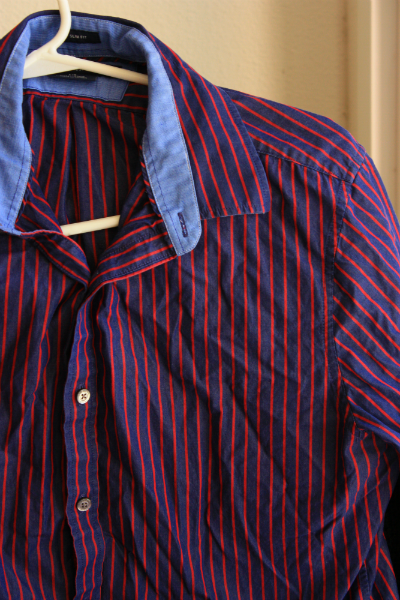When I introduce myself, I rarely say I’m transgender. The word is clumsy; it’s also not the first word I learned to describe who I am now.
My first identity was Vietnamese American, in the awkward way that only a kid who grew up around other Vietnamese American kids could be. I loved--and still love--Little Saigon in Orange County, but there was something suffocating about growing up around other Vietnamese Americans who had varying levels of cultural involvement. Some went to Vietnamese school on Saturdays; others participated in lion dances; others were involved in the Vietnamese equivalent of “Boys Scouts”; others had monthly parties with their large, extended families.
I had none of those experiences. I had my mom, my stepdad’s relatives, and myself. My mom had few friends. We were isolated, like islands, but across the horizon I could always hear and see what other Vietnamese families did or didn’t do. In comparison, I never felt “Vietnamese” enough. My classmates described me as whitewashed or uncultured, no matter how well I spoke Vietnamese. For me, my Vietnamese identity overshadowed my gender identity, just because I was always striving to be more Vietnamese, whatever that meant.
My gender was a critical factor to my mom. Many of her life choices had been influenced by gender. She had three biological children, but I was the only one she could call her con gái. Her daughter. My mom ran away from her abusive first marriage, but she didn’t feel guilty for leaving her sons behind. They were con trai, or boys, who would grow up into men. She felt they didn’t need her, but her con gái needed a mother the most. She could never leave me behind. No matter how I looked at it, she had equal stakes in both gender and culture--or, rather, that one couldn’t be separated from the other..
My first identity was Vietnamese American, in the awkward way that only a kid who grew up around other Vietnamese American kids could be. I loved--and still love--Little Saigon in Orange County, but there was something suffocating about growing up around other Vietnamese Americans who had varying levels of cultural involvement. Some went to Vietnamese school on Saturdays; others participated in lion dances; others were involved in the Vietnamese equivalent of “Boys Scouts”; others had monthly parties with their large, extended families.
I had none of those experiences. I had my mom, my stepdad’s relatives, and myself. My mom had few friends. We were isolated, like islands, but across the horizon I could always hear and see what other Vietnamese families did or didn’t do. In comparison, I never felt “Vietnamese” enough. My classmates described me as whitewashed or uncultured, no matter how well I spoke Vietnamese. For me, my Vietnamese identity overshadowed my gender identity, just because I was always striving to be more Vietnamese, whatever that meant.
My gender was a critical factor to my mom. Many of her life choices had been influenced by gender. She had three biological children, but I was the only one she could call her con gái. Her daughter. My mom ran away from her abusive first marriage, but she didn’t feel guilty for leaving her sons behind. They were con trai--boys--who would grow up into men. She felt they didn’t need her, but her con gái needed her the most. She could never leave me behind.
With the news of me not wanting to present as female, my mom was able to understand my aloofness over the years. For the first time since her separation from my biological father, I laughed with my mom without worrying that we would start fighting.
Six months after I came out to my mom, she took me to a clothing outlet on my request. Normally, she would pick out clothes from the women's section.
That day my mom went straight to the men's section, picked up a men's shirt, and said, "This is a nice shirt. Why don't you try it on?"

One of the many, many men’s shirts my mom would eventually end up buying me. I’m sure there are more to come.
When I introduce myself, I rarely say that I’m transgender. But I do say, I’m Tony, second generation Vietnamese American man born of immigrants, người Mỹ góc Việt, American rooted in Vietnam, to remember where I’ve come from. Most of all, I say it to remember my mother, who always has a space for me in her heart, even as I stumble through languages that have no space for me.
When I introduce myself, I rarely say I’m transgender. The word is clumsy; it’s also not the first word I learned to describe who I am now.
My first identity was Vietnamese American, in the awkward way that only a kid who grew up around other Vietnamese American kids could be. I loved--and still love--Little Saigon in Orange County, but there was something suffocating about growing up around other Vietnamese Americans who had varying levels of cultural involvement. Some went to Vietnamese school on Saturdays; others participated in lion dances; others were involved in the Vietnamese equivalent of “Boys Scouts”; others had monthly parties with their large, extended families.
I had none of those experiences. I had my mom, my stepdad’s relatives, and myself. My mom had few friends. We were isolated, like islands, but across the horizon I could always hear and see what other Vietnamese families did or didn’t do. In comparison, I never felt “Vietnamese” enough. My classmates described me as whitewashed or uncultured, no matter how well I spoke Vietnamese. For me, my Vietnamese identity overshadowed my gender identity, just because I was always striving to be more Vietnamese, whatever that meant.
My gender was a critical factor to my mom. Many of her life choices had been influenced by gender. She had three biological children, but I was the only one she could call her con gái. Her daughter. My mom ran away from her abusive first marriage, but she didn’t feel guilty for leaving her sons behind. They were con trai--boys--who would grow up into men. She felt they didn’t need her, but her con gái needed her the most. She could never leave me behind.


